New Yorkers could pick a political newcomer to run their city - and take on Trump
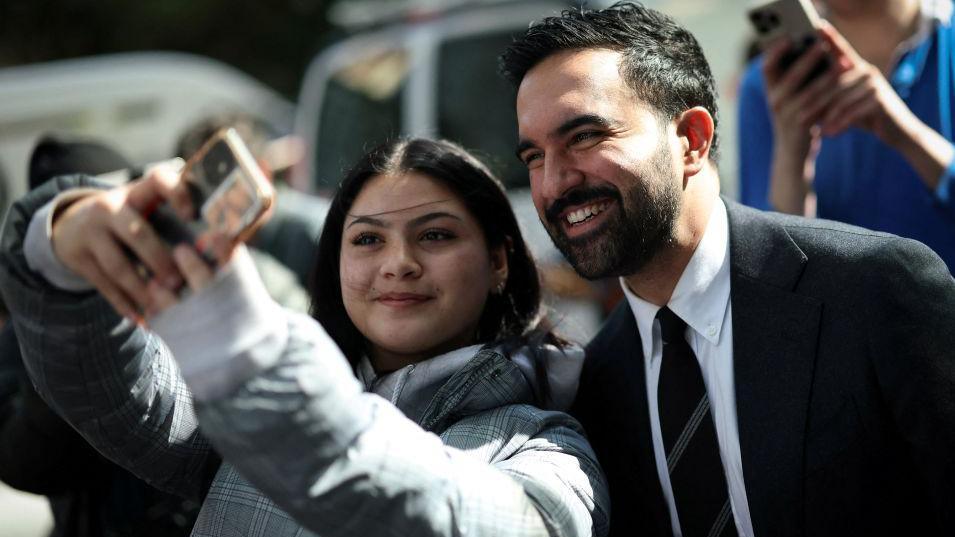
Zohran Mamdani, the Democratic frontrunner for New York City mayor, can barely walk a few steps without being stopped by supporters
- Published
As Zohran Mamdani walked the streets of the Upper East Side for a campaign event to greet early voters, he could barely walk a few steps without being stopped by his supporters.
Two smiling young women looked starstruck and told him they followed him on Instagram. The millennial Democratic nominee for mayor thanked them before posing with another young man who had readied his phone for a selfie.
Throngs of press surrounded Mamdani and captured his every moment, like running into the street to shake hands with a taxi driver shouting "we support you, man".
With a comfortable lead in the polls, the 34-year-old is on the brink of making history when New Yorkers vote on Tuesday, as the youngest mayor in over a century and the first Muslim and South Asian leader of the city.
A relatively unknown figure just months ago, few could have predicted his rise, from hip-hop artist and housing counsellor to New York State assembleyman and frontrunner to lead the biggest city in the US, a job which comes with a $116bn (£88bn) budget and global scrutiny.
Leading a three-way race
Through viral videos and outreach to content creators and podcasters, Mamdani has reached disaffected voters at a time when faith in the Democratic party among its own members is at an all-time low.
But there are questions over whether he can deliver on his ambitious promises and how a politician with no executive experience will handle the onslaught sure to come from a hostile Trump administration.
There is also the complicated relationship he has with his party establishment, as he becomes a national figurehead for left-wing Democrats.
He describes himself as a democratic socialist, which has no clear definition but essentially means giving a voice to workers, not corporations. He has promised to tax millionaires to pay for expanded social programmes. It's the politics of Bernie Sanders and Alexandria Ocasio-Cortez with whom Mamdani has often shared a stage.
Trump has threatened to withdraw federal funds if New Yorkers elect a "communist".
Mamdani has refuted that common attack line about his politics and during a daytime television interview he agreed with the host that he was "kind of like a Scandinavian politician," only browner, he joked.
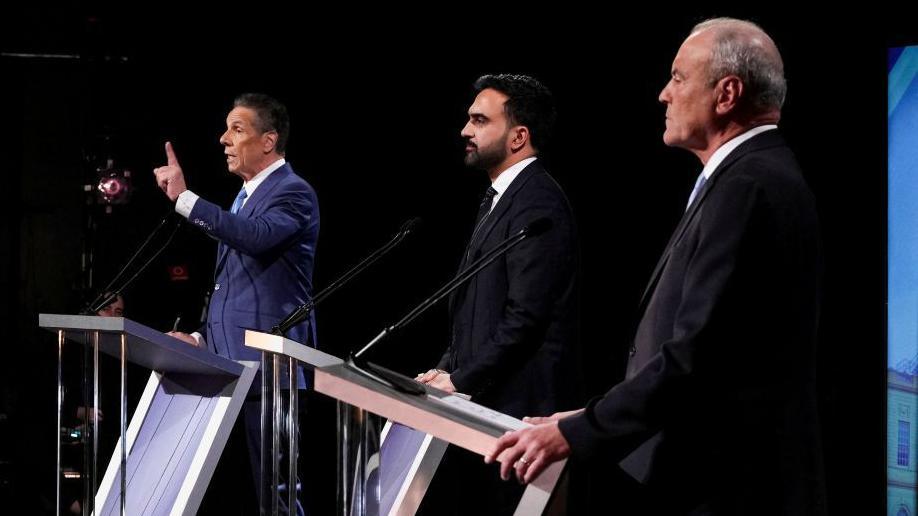
Mamdani's rivals, Andrew Cuomo (left) and Curtis Sliwa (right) have pulled no punches taking him on
Victory would be seen as a rejection of politics as usual by New Yorkers as they struggle with the cost of living - Mamdani's number one issue.
His main rival in Tuesday's vote is former Democratic Governor Andrew Cuomo, who is running as an independent after losing to Mamdani in the primary.
Cuomo accuses Mamdani of an anti-business agenda that would kill New York. He says he has shown he can stand up to Trump but Mamdani calls Cuomo the president's puppet.
Curtis Sliwa, the Republican nominee, mocks both of them. In the last debate, he said: "Zohran, your resume could fit on a cocktail napkin. And Andrew, your failures could fill a public school library in New York City."
Rent freezes and free buses
Mamdani's message has been laser-focused on affordability and quality of life issues. He has promised universal childcare, freezing rent in subsidised units, free public buses and city-run grocery stores.
It's a message that has landed with New Yorkers fed up with sky-high prices.
"I support him because I'm a housing attorney and I see how the cost of living just keeps going up and up and up," Miles Ashton told the BBC outside the candidates' debate earlier this month. "We all want an affordable city."
The costs of the Mamdani agenda would be covered by new taxes on corporations and millionaires, which he insists would raise $9bn - though some, like the libertarian Cato Institute, say his sums don't add up, external. He would also need the support of the state legislature and Governor Kathy Hochul to implement new taxes.
Watch moments from Zohran Mamdani's campaign for mayor
She has endorsed him but says she is against increased income taxes. She does, however, want to work with him to achieve universal child care, which is by far the biggest-ticket item on his agenda at $5bn.
As he rode the M57 bus across Manhattan to highlight his free buses plan, he told the BBC why his focus on affordability was the right approach in the Trump era.
"It's time for us to understand that to defend democracy, it's not just to stand up against an authoritarian administration. It is also to ensure that that democracy can deliver on the material needs of working class people right here. That's something we've failed to do in New York City."
Among New Yorkers who told the BBC they were not voting for Mamdani, doubts about him being able to pay for his agenda and his inexperience were two of the biggest factors.
What New York business world thinks
After Mamdani won the Democratic primary in June, Wall Street leaders were hardly celebrating. Some threatened to leave the city.
But there's been a noticeable shift since then - the mood is less panic, more collaboration. JPMorgan Chase CEO Jamie Dimon even said he would offer his help if Mamdani is elected.
Real estate developer Jeffrey Gural, who has met Mamdani, says he is too inexperienced to lead the nation's largest city. He thinks his rent freeze plan would hurt tenants and his taxes on wealthy people will drive high earners away.
He does, however, support Mamdani's universal childcare plan, a provision he gives his own staff at his casino upstate.
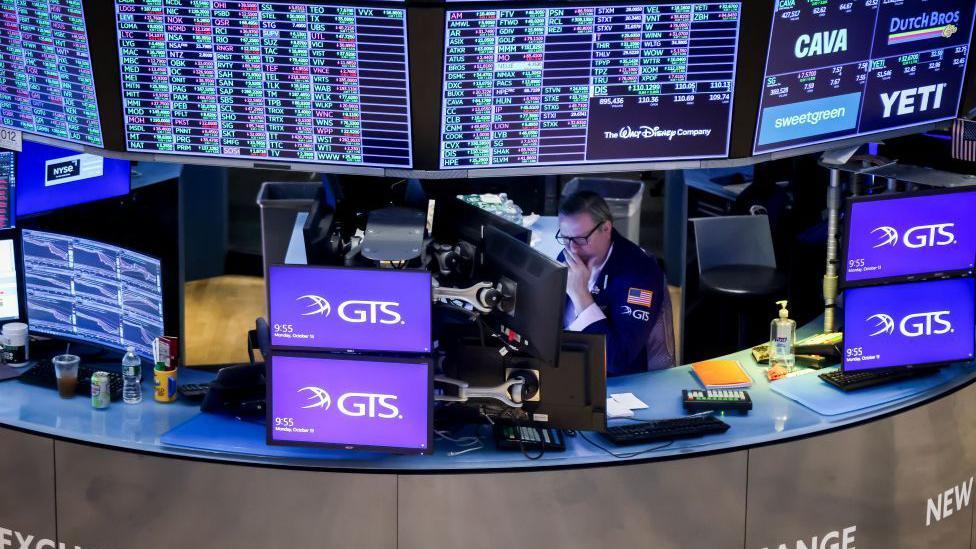
Wall Street traders were initially cool on Mamdani's candidacy - but have since shown signs of collaboration
Part of the change in tone since the primary has been down to a concerted effort on Mamdani's part to meet his critics.
On 14 October, Alexis Bittar, a self-taught jewellery designer who grew his business into a global company, hosted Mamdani and 40 business leaders at his 1850s Brooklyn townhouse.
They were a mix of CEOs and business owners from financial, fashion and art sectors. More than half were Jewish and they were all either on the fence or opposed to Mamdani's candidacy.
There were questions about business, his management experience and how he would finance his agenda.
"I think he came across great," Mr Bittar told the BBC. "The thing that's remarkable about him is he's incredibly equipped to answer them - and diligently answer them."
An apology to police
Part of Mamdani's engagement with his critics has been a willingness to change his position.
In 2020, after the murder of black man George Floyd by a police officer in Minnesota, Mamdani called for the city to defund police and called the NYPD "racist". But he has since apologised and says he no longer holds those views.
Crime is the number one issue for Howard Wolfson, who worked for former Mayor Michael Bloomberg and is now a Democratic strategist. He was present during a meeting last month between the mayoral hopeful and Bloomberg, who spent $8m during the primary race trying to beat him.
Wolfson told the BBC he will judge Mamdani on how the city is policed.
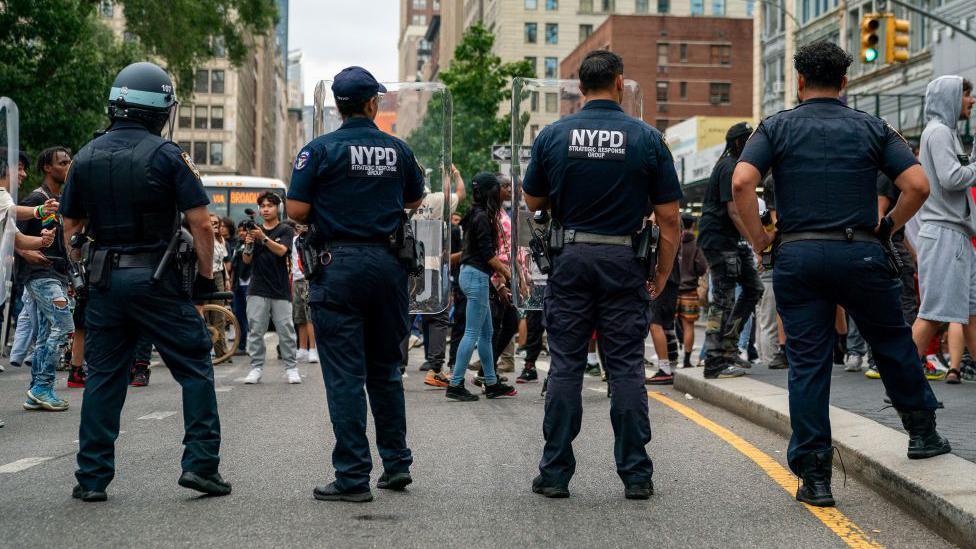
Mamdani has apologised for earlier calling the New York Police Department "racist"
"I think it's great that he reaches out and is engaged, but I'm much more interested in how he's going to govern," he said. "Public safety is really the prerequisite for success or failure."
Many see Mamdani's pledge to ask the police commissioner Jessica Tisch to stay on as a way to allay concerns he would be soft on crime.
He says he would maintain the current level of NYPD staffing and create a new department of community safety that would deploy mental health care teams instead of armed officers to non-threatening, psychiatric calls.
A city divided over Gaza
One position Mamdani has stood firm on is his criticism of Israel and lifelong support for Palestinian rights.
It represents a break from the Democratic party establishment and could be a deciding factor for many voters in a city with the largest Jewish population outside of Israel.
He sparked outrage during the primary process when he refused to condemn the term "globalise the intifada". But after Jewish New Yorkers expressed their unease to him, telling him they felt unsafe on hearing it, he said he discouraged others from using it.
A letter signed by more than 1,100 rabbis cited Mamdani as it condemned the "political normalisation" of anti-Zionism. Jewish voters are largely split between Mamdani and Cuomo in polling.
Brad Lander, the city's comptroller, or financial chief, who teamed up with Mamdani in the Democratic primary to endorse each other's candidacy against Cuomo, says many Jewish New Yorkers like him are very enthusiastic about Mamdani.
He is a mayoral candidate deeply committed to keeping everyone safe, regardless of religious beliefs, Lander told the BBC.
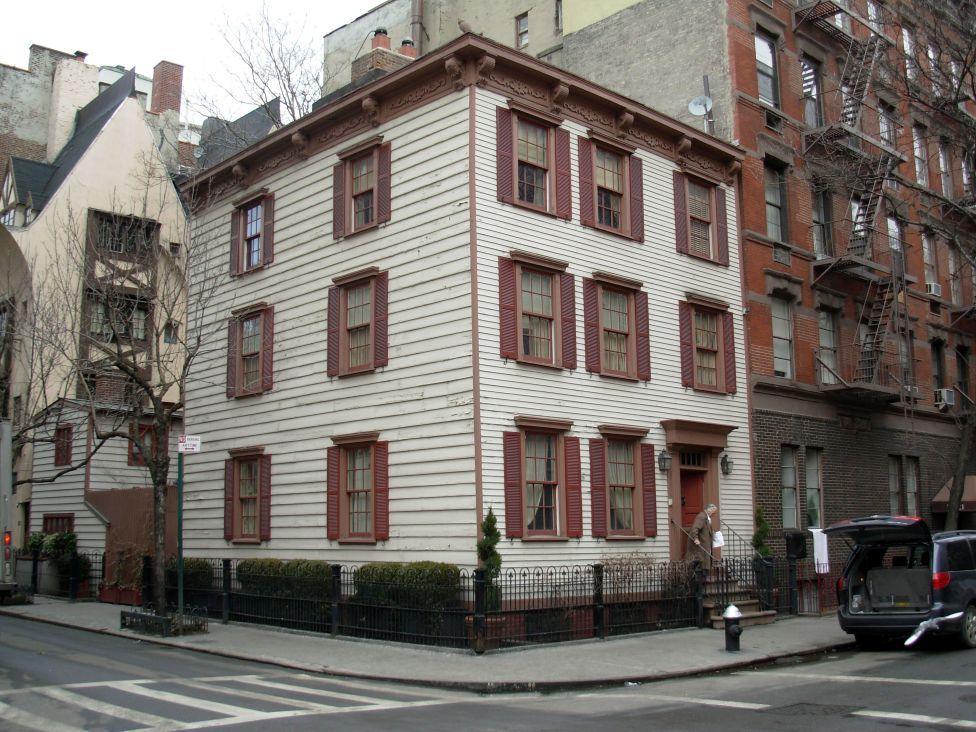
Housing costs are a major issue in New York
Sumaiya Chowdhury and Farhana Islam of the group Muslims for Progress have canvassed for the mayoral hopeful.
Ms Islam said that, while they were all excited that he could be New York's first Muslim mayor, he didn't need to lean on his identity for support.
"His policies speak for themselves and they alone are enough to make him popular."
Since his primary win, the Islamophobia Mamdani faces has increased. He now has police security and, last month, a Texas man was arrested on charges of making terroristic threats against him. In one message, the man said "Muslims don't belong here".
Mamdani decided to deliver an address on Islamophobia after Cuomo laughed along to a radio talkshow host saying that Mamdani would cheer another 9/11-style attack.
In an emotional speech, he said he had hoped that by ignoring racist attacks and sticking to a central message, it would allow him to be more than just his faith. "I was wrong. No amount of redirection is ever enough."
Future of the party
What may propel Mamdani to victory in liberal New York may not be a recipe for success nationally. And Democrats in Congress seem worried about the implications of his ascendancy as party tensions between moderates and progressives persist.
Senate Minority Leader Chuck Schumer had not endorsed Mamdani as of Tuesday morning, while his fellow New Yorker House Minority Leader Hakeem Jeffries only endorsed him a few hours before early voting began.
Democratic strategists have said the problem posed by Mamdani for the party's establishment is that Trump and the Republicans already cast Democrats, no matter how moderate, as socialists. And it's a tactic that is thought to have landed with some effect among Cuban and Venezuelan voters in the 2024 election.
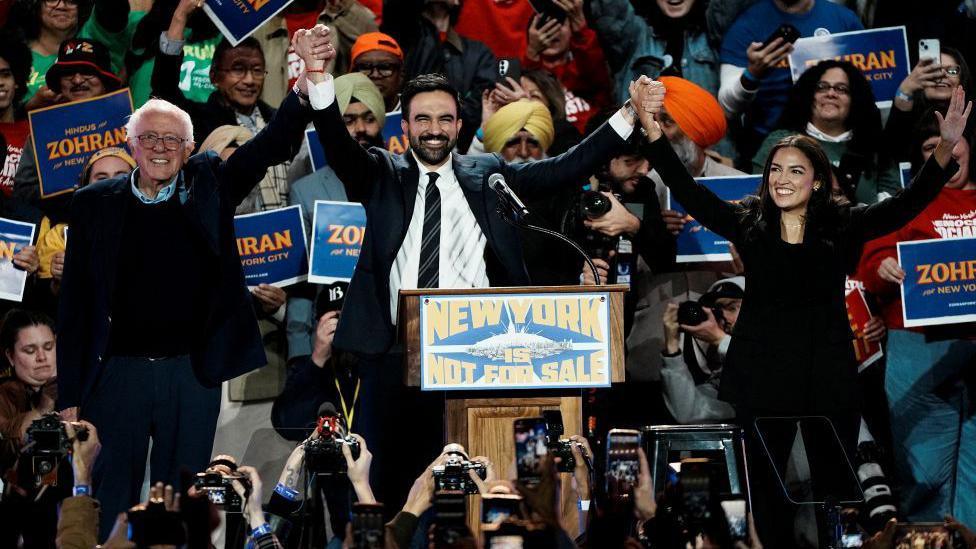
Mamdani has often shared a stage with Bernie Sanders (left) and Alexandria Ocasio-Cortez (right)
Josh Gottheimer, the moderate Democratic representative of New Jersey, told the Washington Post, external he thought Mamdani had "extremist views" at odds with the Democratic party and that he feared Republicans will use the candidate as a kind of "bogeyman".
At a campaign event on the Upper East Side, Mamdani told the BBC how he plans to handle the intense scrutiny if he wins, pointing to the energy behind his candidacy.
"There is no doubt that there will be opposition as we see that opposition today, and what has allowed us to surmount the unbelievable amounts of money that has been spent against this campaign in the primary or the general, has been the mass movement that we have created."
Paloma Naderi, 38, volunteering at the event, said the last time she had been this excited to vote had been for Barack Obama in 2008. Since then she's been disappointed by what she called the lack of bravery within the party.
"I feel like this race means so much to me because it's local. It's going to affect me, my family, my friends, everyone here in New York City.
"But it's also sort of sending a message, up the chain about what we want politics to start to look like on the Democratic side on a national level."
Additional reporting by Grace Goodwin